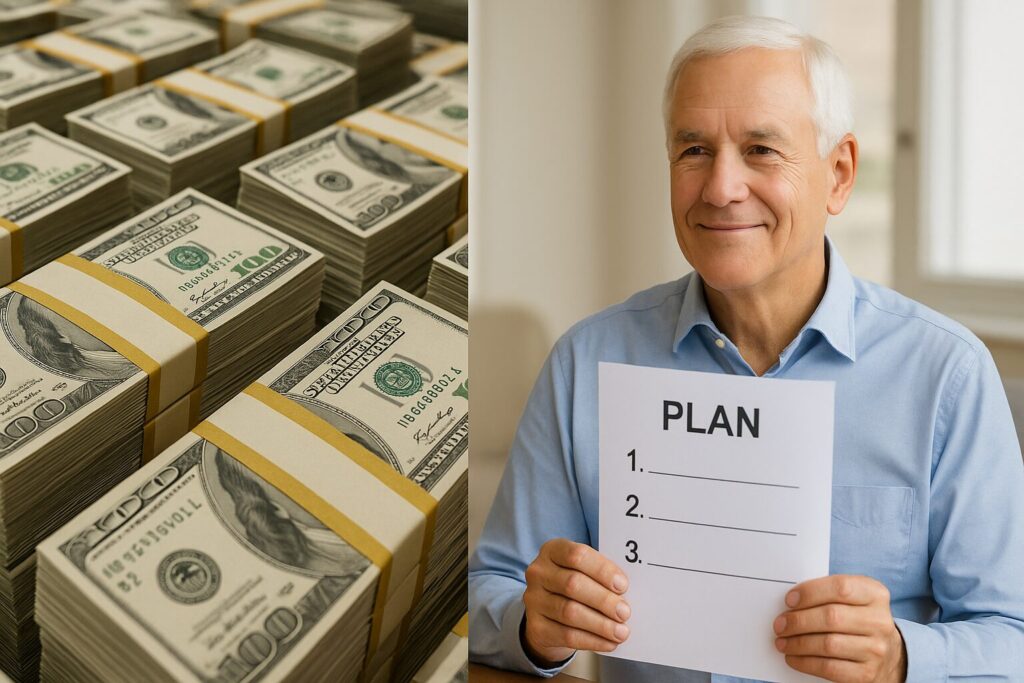
Why Peace of Mind Has Less to Do with Your Balance and More to Do with Your Plan
Welcome to “Money Myths Retirees Still Believe”—a blog series that uncovers the hidden beliefs that can quietly sabotage your financial peace of mind.
Many retirees cling to common money myths that seem true but can lead to poor decisions, lost income, or unnecessary worry. Each post in this series explores one myth—like “cash is trash” or “I need to beat the market”—and replaces it with a smarter, simpler mindset.
If you’re retired or nearing retirement, this series will help you reassess your approach and feel more confident about your financial future.
The Myth: “If I Just Had More Money, I’d Feel Secure”
Helen had saved diligently throughout her working years. By the time she retired at 68, she had a $900,000 nest egg, no debt, and modest living expenses. But she still couldn’t shake the worry.
“I know it’s a good amount,” she admitted, “but I keep thinking—what if it’s not enough?”
So she kept watching her account balance every day, feeling anxious during downturns, and hesitant to spend—even on things she could afford. Her financial planner finally asked:
“What number would make you feel secure?”
Helen paused. “I don’t know. Maybe a million? Or two?”
That’s when she realized: there’s always a bigger number.
But chasing a bigger balance doesn’t always bring peace.
👉 The real solution isn’t more money—it’s more clarity.
Why This Myth Persists
It’s completely understandable. We’ve been taught for decades that:
- Bigger savings = better outcomes
- More money = more security
- If you’re still worried, you probably don’t have enough
But in retirement, the rules shift.
You’re no longer earning a paycheck—you’re turning your savings into a paycheck.
That transition can be scary. So it’s easy to believe the answer is more—more savings, more income, more cushion.
But here’s the truth:
You can have plenty of money and still feel insecure.
And you can have modest savings and feel completely at ease—if you have the right plan in place.
The Smarter Mindset: Know Your Numbers, Not Just Your Balance
Security comes from knowing:
- How much income you’ll receive each month
- Where that income is coming from
- How long your money will last—even in bad markets
- That you’ve planned for healthcare, inflation, and emergencies
- That you don’t need to “guess” your way through retirement
This kind of clarity reduces anxiety far more than simply adding another $50,000 to your portfolio.
Instead of fixating on your total balance, shift your focus to cash flow and stability.
How to Feel Secure (Without Needing Millions)
Here are a few ways retirees build confidence—without needing “more”:
✅ Create a written income plan.
Know where every dollar is coming from—Social Security, pensions, dividends, bond interest, annuities, etc.
✅ Use the Bucket Strategy.
Segment your savings into short-term (cash), mid-term (income), and long-term (growth). It gives structure—and peace of mind.
✅ Add guaranteed income.
Consider a simple immediate annuity to cover basic expenses. Knowing your essentials are paid for helps reduce fear of running out.
✅ Automate your withdrawals.
Set up a monthly “paycheck” from your portfolio so you’re not constantly checking balances and moving money manually.
✅ Build a financial “shock absorber.”
Have a year or more of expenses in cash or ultra-safe investments to handle surprises without selling assets in a downturn.
✅ Talk to a trusted advisor.
Sometimes, the right conversation can reassure you more than another $10,000 in savings.
A Real-Life Example
Jerry had $600,000 saved when he retired—less than many of his peers. But he had a pension, Social Security, and a conservative portfolio of dividend-paying funds and bond ladders that paid him $3,800 a month—more than enough for his needs.
He didn’t feel poor.
He didn’t check the markets every day.
And he didn’t worry about running out of money.
“I know where my money comes from,” he said. “And I know it’s enough.”
That’s financial peace.
The Danger of “More is the Goal”
If you believe you’ll only feel safe once you hit some magic number:
- You might keep working longer than necessary
- You might invest too aggressively chasing higher returns
- You might feel guilty or fearful every time you spend
- You might never give yourself permission to enjoy your money
That’s no way to live.
The Takeaway
Money is just a tool.
It doesn’t give peace. A plan does.
It doesn’t provide security. Understanding does.
It doesn’t bring happiness. Clarity and confidence do.
So the next time you find yourself thinking, “I’d feel better if I just had more,” pause and ask:
- Do I have enough income to cover my needs?
- Do I have a plan to deal with inflation, taxes, or healthcare costs?
- Do I know where to turn if something changes?
If the answer is yes, then it might not be “more” you need.
It might just be a reminder that you’re already doing fine.